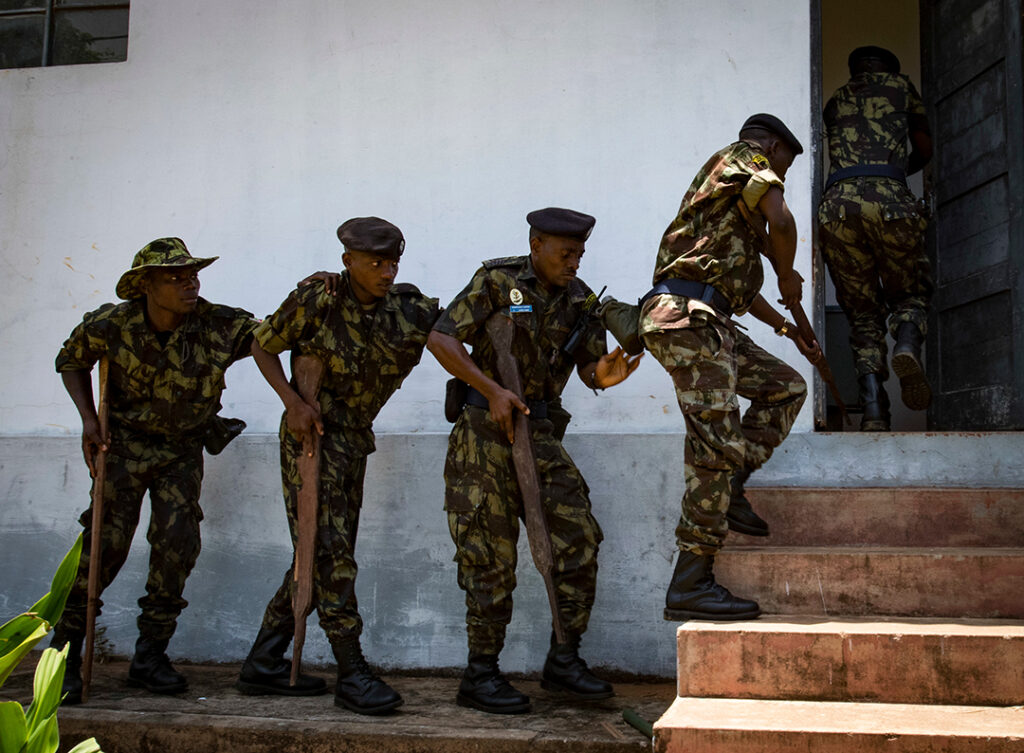ADF STAFF
A coastal area near Mozambique’s border with Tanzania has become the latest hot spot in the ongoing insurgency by extremists in Mozambique.
Attacks against villages near the administrative post in Quionga the last two weekends of February sent hundreds of residents fleeing into the forest for safety. Attackers armed with machine guns and machetes stalked the towns of Quirinde and Namoto, burning homes and looting supplies.
Although defense forces reestablished control, the violence signals that extremists once again are armed and ready to fight after a relatively quiet start to the year.
“After a lull of several weeks, caused by floods and some improvements in the fighting capacity of the Mozambique forces, the insurgents seem to be on the march again,” wrote Peter Fabricius in South Africa’s Daily Maverick. “Evidently [they were] resupplied with small arms by dhow from Yemen and Somalia.”
Terrorists have fought a bloody insurgency to overtake Mozambique’s Cabo Delgado Province since 2017. Over time the violence has grown in sophistication and reach. The extremist group is named Ahlu Sunna wa-l-Jama’ah, but locals call it al-Shabaab even though it is not part of the Somalia-based insurgent group.
It originated from decades of political and religious strife after the country achieved independence. What began as a local conflict in Mocimboa da Praia led to a string of attacks on police in the district and ultimately spread to other districts in northern and central Cabo Delgado.
The insurgents stepped up attacks in 2019 and began engaging military forces. In 2020, the group launched more than 20 attacks per month and seized Mocimboa da Praia three times, attacking by land and sea in tandem.
“The insurgents now have a strong maritime capability, which is rapidly evolving,” Armed Conflict Location & Event Data Project (ACLED) analyst Jasmine Opperman told The Sunday Times newspaper in September 2020. “They are sealing off the region both by land and sea and exerting their dominance.”
Insurgents have razed villages and beheaded some of their more than 2,500 victims since 2017. The U.N. estimates that 670,000 people have been forced to flee their homes since the outbreak of the conflict.
The displacement led to a humanitarian crisis as people were forced to walk in the dense jungle for a week or more to reach the relative safety of a city. They arrive malnourished and often traumatized by what they have seen.
“In the jungle they come across dead people — relatives or neighbors from their villages who have been murdered, their bodies dismembered, and their heads cut off,” Patricia Postigo, medical coordinator with Médecins Sans Frontières, told ReliefWeb. “They also see people who have died of hunger or thirst. They tell you that they can’t get these images out of their heads.”
According to an October 2020 report on the website of Combating Terrorism Center at West Point, the group’s violence peaked in 2020 as members grew bolder and employed more sophisticated weaponry and tactics.
Since January, however, Mozambican forces have gone on the offensive with help from counterterrorism resources from the United States, training from the European Union and Portugal, troops from the Malawi Defence Force, and coordination with Tanzanian police.
Military operations have killed dozens of terrorists, seized weapons, and destroyed vehicles and boats used for attacks. Recent ACLED statistics show the effects of increased ground and air strikes by government forces as insurgents struck 10 times in January, down from 30 in December 2020.
Looking to capitalize on those gains in February, President Filipe Nyusi publicly offered amnesty to the insurgents, saying the country would “do everything to receive you safely and guarantee your reintegration.”

